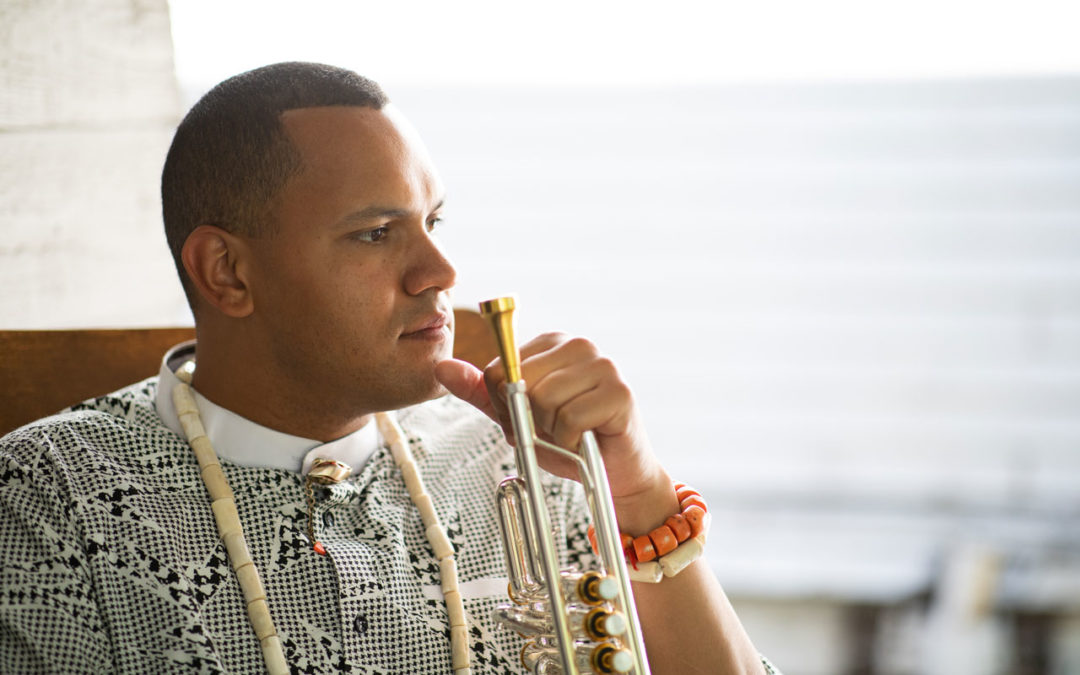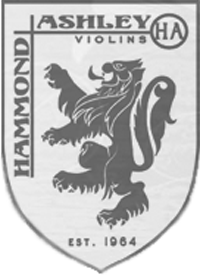Ahamefule Oluo by Naomi Ishisaka
By Paul Rauch
Seattle’s own Ahamefule J. Oluo is difficult to categorize as an artist. A musician, comedian, composer, director—and the Artist in Residence for the 2020 Earshot Jazz Festival. Oluo committed to the festival prior to the COVID-19 pandemic, a pairing that feels only more spot on now. He’s not your typical jazz artist, and this isn’t your typical jazz festival.
His residency is marked historically by Earshot’s decision to deliver the festival digitally to a jazz community starving for live performance during a worldwide pandemic. The festival, now in its 32nd year, is scheduled to stream across four weekends beginning October 16 and features one of a kind performances and community conversations as a salve for trying times.
Art as an agent for processing pain into meaning is something Oluo is no stranger to. His work in music, comedy, theater, and film over the past decade offer nuanced portraits of vulnerability, heartache, and triumph from his personal experiences.
When it comes to jazz, technique and education have noticeably shifted into institutions of higher learning. Oluo, on the other hand, acquired his chops the more traditional way— by way of mentors, and by listening. While his goal has never been to be a jazz trumpeter in the traditional sense, Oluo makes clear that jazz is foundational to nourishing his holistic artistic practice.
“Jazz is my first love, before anything else, says Oluo. “It’s the first thing that opened my eyes to what an artistic concept was. I learned everything about life through jazz. I have no formal education. I didn’t graduate high school. I went to Cornish one year, but had a child in that year and was barely present. Jazz is my school. Records are my school, the lives of those people.”
As a trumpeter, Oluo is most prominently known for his past work with the neo-fusion quartet, Industrial Revelation. Teaming with longtime friends Evan Flory-Barnes, D’Vonne Lewis, and Josh Rawlings, the band attracted a broad audience through a sound that bridged generations and associated musical identities. Oluo’s innovative use of electronics added to his naturally dynamic sound, creating a musical persona that fit perfectly into the group’s common vision of musical adventurism. The band received a Stranger Genius Award in 2014.
In a city with a deep jazz legacy, Oluo makes note of feeling a disconnect with the greater jazz community. Aside from his previous work with Industrial Revelation, he is not known to headline jazz performances, or gig as a sideman. In his earlier days, at jam sessions, he didn’t know the seemingly hundreds of tunes more traditional players have down pat. Participation was difficult, in part due to social anxieties. Nonetheless, he would be at the hang Tuesday nights at the Owl ‘n Thistle session, contributing when he could, opening ears with his treatment of ballads, where his rich, deep sound could be best applied.
“I’ve never been super interested in being a conventional jazz musician,” he remarks, choosing instead to focus on performing original tunes of his own and of artistic collaborators.
Oluo’s residency at this year’s Earshot Jazz Festival will shed light on his manifold artistry, and its impact on not only Seattle’s jazz scene, but the city’s greater arts community. “Being a part of this festival allows me to be more connected with the wider jazz scene in Seattle than I’ve been able to, due to the nature of my work,” he says.
The nature of Oluo’s work employs a dizzying array of skills. From stand-up comedy, to composing and arranging jazz orchestral pieces, from stage and film acting, to script writing, Oluo channels his creative energy wherever it’s being called—leading, so far, to two theater shows and a film.
If you were to describe Oluo in one word, it’d be storyteller. Stand-up is the catalyst that set his storytelling in motion and accelerated his maturity as a multi-dimensional artist. Oluo’s creative energy pulled him into standup comedy in 2005, when as a young father, he went through the ordeal of a divorce. Comedy provided an antidote to the accompanying depression. “All of my comedy, the catalyst for it, came from dealing with darker sides of my existence,” he says. While jazz had opened up a pathway to creative conception, comedy was a revelation that spawned a complete artist. “If jazz is my Charlie Parker, then comedy is my Coltrane,” he quips.
For Oluo, the medium is a means to the message. “I actually don’t see any of the things I do as being different from each other. I don’t think of music being different from comedy, or acting as being different than either of those things. I approach all these things from a conceptual viewpoint. There’s a message I want to convey any way I see fit. Taking your eye off the message is where you can go wrong,” he offers.
To Oluo, nailing a perfect trumpet solo is akin to delivering the perfect punchline—and they both hang on being in relationship with an audience. “The place where I think they’re similar, is that when I’m performing, everything has to have a punchline. It has to have that emotional punchline. It has to culminate with some kind of communal emotional shift,” he says.
Oluo debuted his life work, Now I’m Fine, during a Town Hall residency in 2012. The ten-movement pop opera written for a 17-piece orchestra features Oluo’s long-form comedic storytelling. He delivers a dark, poignant monologue about a period of illness, tragedy, and regeneration seamlessly coalesced with his original musical score. While he admits his compositional approach is a slow, trial and error process, Oluo has found freedom in trusting his instincts, saying “I trust things that come out of my unconscious brain, more than things that come out of my conscious brain.”
Now I’m Fine addresses the absence of Oluo’s Nigerian father, the struggles of his single mother, becoming a father himself, getting a divorce, and a mystery illness that dissolved his skin across his entire body—all over the course of an emotionally devastating year. He remarks in his monologue, “By the time I was 19, I had a daughter, by the time I was 21, I had two daughters. By the time I was 22, I had a vasectomy.”
Oluo supplied a narrative of his family history as part of the Chicago Public Media program, This American Life with Ira Glass in October 2015. The episode offers a further exploration on Oluo’s ties to his Nigerian father and his life with his single mother—a white woman from Kansas. The podcast, which was also broadcast on over 500 stations, brought national attention to Oluo’s work and featured his most alluring quality—his ability to intimately engage an audience in his narrative.
An all Seattle music cast contributed to Now I’m Fine, most prominently featuring the sparkling vocals of okanomodé SoulChilde. The show opened at On the Boards in December of 2014, then moved to the Moore Theatre, the Public Theatre in New York, and beyond. A film version, Thin Skin, co-written by Charles Mudede and Oluo’s wife, Lindy West, is soon to be released following COVID-19 related delays.
Out of Now I’m Fine came another story worth expanding—that of his single, white mother, who raised him and his sister, bestselling author Ijeoma Oluo, after her Nigerian husband left to visit his homeland and never returned. That story is called Susan, and debuted at On the Boards in December of 2019. Oluo lovingly calls his mother Susan “the most comically optimistic person on earth.” The darkly comical musical portrait is incredibly soul-baring. “She loves the show, but the show is not exclusively positive about her,” notes Oluo.
Susan was to go on tour in 2020, plans altered by the COVID-19 pandemic. Oluo expresses a mixture of wistfulness and sense of deep appreciation in this moment: “My experience is always directed at the musicians I’m working with,” he remarks. “I was supposed to be touring with Susan all year, going to all these different places with a group of people who are absolutely some of my favorite people in the world. As much as I appreciated [touring] before, my appreciation for it has skyrocketed. To be in a world where that is possible would be amazing.”
It was a great letdown. A year of touring with this show that had been in the works for five years has become a phantom image of some diminishing flicker of hope in the distant future. To Oluo, that last show in New York in January had been where they had finally gotten it right. One show to feel the culmination of countless hours of hard work. “That last show, we really got it right,” he states emphatically.
Oluo’s adaptability and willingness to follow the creative energy to the form positions him to be an engaging force as the Earshot Jazz Resident Artist, as the festival embraces an all new digital landscape. Attendees can expect to see video projects from Oluo’s home studio in the Hood Canal region. The festival offers a unique opportunity to not only witness Oluo’s talent as a trumpeter and composer, but to delve further into all of the tools in his artistic toolbox.
Whether he is spinning a comedic monologue, composing for and directing a jazz orchestra, or blowing a long blues into the night, Oluo brings a voracious energy driven by curiosity. Of the many shapes his creative energy takes, Oluo states simply, “It’s an exploration of how we deal with things.”





